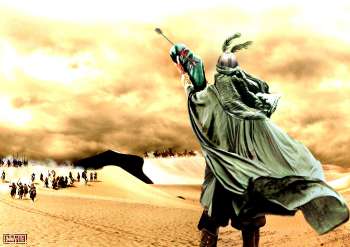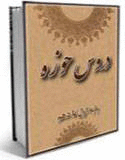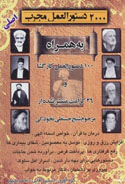In the School of Imam Husain (AS) – 2

Today is the second of Moharram which saw the land of Karbala graced by the presence of the grandson of Prophet Mohammad (blessings of God upon him and his progeny). Stay with us to hear more on the sequences of history’s most heartrending tragedy that continues to remain fresh in the minds of the believers and inspires them to new heights, despite the passing of a millennium three centuries and 77 years.
God, in the Holy Qur’an, has enumerated courage as one of the main characteristics of saintly persons. Ayah 39 of Surat al-Ahzaab notes:
“Such as those who deliver the messages of Allah and fear Him, and fear no one except Allah, and Allah suffices as Reckoner.”
Ever since childhood Imam Husain (AS) was the embodiment of courage and bravery in a unique and exemplary manner – a matter that astounded both friends and foes. With patience, he endured the calamities that befell the Noble Family following the passing away of his beloved grandfather, followed by the tragic martyrdom of his mother, Hazrat Fatema Zahra (SA). In the prime of manhood, during the caliphate of his father, Imam Ali ibn Abi Taleb (AS), he stood firm against any deviation from Islam. The epics which he created during the Battles of Jamal, Seffin, and Nahrawan, increased the reputation of his valour. During the armed encounters, whenever the troops of Islam needed help, Imam Husain (AS) was at their side.
A memorable incident during the battles of the War of Seffin is recorded in glowing terms in Islamic history. When the forces of Mu’awiya the rebellious governor of Syria fortified the banks of the River Euphrates at Reqqa and denied the army of the Commander of the Faithful, Imam Ali (AS), any access to the waters, the brave father gave command of a detachment of troops to his brave son to resolve the problem. Imam Husain (AS), who was in his early thirties, dashed towards the river, scattered the Omayyad troops, and not only placed the fresh flowing Euphrates at the service of the army of Islam, but also allowed the retreating enemy troops access to its waters, saying the bounties of God, which are meant for all, should not be blocked even to the enemies of God. This is among the most perfect examples of bravery, coupled with magnanimity.
Imam Husain (AS), like his father, elder brother, Imam Hasan (AS), and the rest of the noble Ahl al-Bayt, always opposed falsehood and strove to safeguard truth. During the initial years of his God-given imamate that coincided with the last nine years of the usurper Mu’awiya ibn Abu Sufyan’s 19-year misrule as caliph, when injustices increases as Muslims became mired in poverty, he never ceased his admonitions to the hoarding of illegal wealth by the Omayyads, although he knew that his admonitions were falling on deaf years.
Once when caravans, carrying valuable assets, headed toward Damascus as part of the taxes levied on the people of Yemen by Mu’awiya, who was now openly violating the tenets of Islam, Imam Husain (AS) decided with firm resolve. He courageously confiscated the whole caravan of riches and distributed them among poor and needy Muslims. Once, while on a visit to Medina in the waning years of his life, Mu’awiya tried to project the libertine Yazid as the next caliph, in violation of the terms of the Treaty which he had signed with Imam Hasan (AS), Imam Husain (AS) stood up and delivered a keynote speech, exposing the ungodly nature of Yazid and admonishing Mu’awiya for favouring such a worthless son.
The peak of courageousness of Imam Husain (AS) became fully manifest in Karbala in the year 61 AH on the 10th of Moharram, that is, the Day of Ashura, when a massive army of 30,000 forces assembled against him, and his companions, brothers, nephews, and sons, were martyred in combat one after another. At the same time, the encampment was witnessing the sounds of wailing of the women and children of the Prophet’s Household. Nonetheless, Imam Husain (AS) was not the least shaken and manifested his unique bravery, which mirrored Ayah 54 of Surah al-Ma’edah where God Almighty says:
“O you who have faith! Should any of you desert his religion, Allah will soon bring a people whom He loves and who love Him, [who will be] humble towards the faithful, stern towards the faithless, waging jihād in the way of Allah, not fearing the blame of any blamer. That is Allah’s grace which He grants to whomever He wishes, and Allah is All-Bounteous, All-Knowing.”
Imam Husain (AS), thus refused to yield to all kinds of threats and aggression, even if his dear and near ones were martyred. Wasn’t he the same Husain who had left Medina for Mecca when the governor of that place conveyed to him Yazid’s demand of oath of allegiance to his ungodly rule? Wasn’t he the same person who while bidding farewell to his brother, Mohammad al-Hanafiyah, had said: I left this city to seek reform for the Ummah of my grandfather, the Prophet of God. I intend to promote virtues and prevent vice, in adherence to the practice of my grandfather and my father? Wasn’t he the Imam who when confronted by Horr’s battalion on his entry in Iraq, said: O people, according to Prophet of Islam, whoever observes a repressive ruler, who has committed sins and oppressed the Muslims, and yet not stood up against such injustice, would be placed within the same degrading status of that unjust ruler?
On that day after exposing Yazid in his true heathen colours, the Imam performed the ritual prayers, which were joined by Horr’s battalion, but following the end of the prayers, when the Imam instructed his followers to proceed, Horr tried to prevent him. The Imam protested and in response, Horr said: “I have not been instructed to fight with you and I have only been told to keep you company until we arrive at Kufa. I hope nothing bad would happen between me and you. Relinquish the idea of battle, because you will most certainly be killed.”
In response, Imam Husain (AS) said: “Are you scaring me of death? Is your task accomplished by killing me?”
Horr was naturally impressed by the high ethical virtues of Imam Husain (AS), and thus on the fateful day of Ashura, as the battle started against the grandson of the Prophet of Islam, he stepped aside and told one of his associates: “By God, I see myself between Heaven and Hell. By God, I will certainly choose Heaven, even if my body is mutilated and I am burnt.”
He made these remarks and headed toward Imam’s camp, where the Imam personally welcomed him. Horr shamefully said: “O grandson of the Prophet of God; may I sacrifice my life for you. I am the one who blocked your path and stranded you in this place. I didn’t imagine that they will fight with you. Now, I have shamefully approached you. Is my repentance accepted?”
The Imam kindly responded: “God accepts your repentance.”
Horr courageously fought the enemies. However, ultimately he fell down soaked in his blood and achieved martyrdom. The Imam remarked by placing Horr’s head in his lap: You are Horr (that is free-spirited) in this world and in the Hereafter.”
مطالب مشابه با این موضوع:
وبگــــــــــردی طلبۀ پاسخگو
- فایل اعمال و رفتار های خلاف قانون جناب آقای حسن روحانی
- در کنج خانه طلبهها چه میگذرد؟
- سکوت چند ساله مسئولان حوزه در قبال حملات وحشیانه به طلاب!
- می گویند که مملکت مملکت آخوندهاست!!
- یک ماجرای تلخ که خانم ها با تأمل بیشتر بخونند
- جریان های تکفیری موجود در عراق و نحوه شکل گیری آنها
- سیر تکاملی تفکر سلفیه چگونه بوده است؟
- بداء در قرآن و حدیث چگونه مطرح شده است؟
- پیامبر (ص) با مخالفین خود چگونه بر خورد می کرد؟
- سبک زندگی حضرت زهرا سلام الله علیها
- ملاک کرامت و شرافت افراد، انسانیت است یا جنسیت؟
- رنگ و پوشش های رنگی در اسلام
- حجاب، زنان را افسرده میکند و مانع پیشرفت اجتماعی آنهاست!!!
- علوم لدنی معصومین
- مگر ولی فقیه معصوم است که ولایت مطلقه دارد؟
- اگر خدا ازعاقبت ما اطلاع دارد قیامت برای چیست؟
- آیا بجای نماز خوندن، پیانو یا سه تار بزنم؟
- چرا مراسم عزاداري امام حسين(ع) پيش از شهادت ايشان صورت ميگيرد؟
- چرا امام حسين(ع) در كربلا براي رفع تشنگي از خداوند طلب باران نكرد؟
دانــــــلود های مفیـــــــــــــــــــد
- دانلود پاورپوینت شناخت وهابیت و صهیونیسم و ارتباط با همدیگر
- دانلود دو پاورپوینت اجرای عید غدیر خم
- دانلود پاورپوینت احتجاج اميرمؤمنان (ع) به غدير
- پژوهشی در کلام و پیام مقام معظم رهبری پیرامون ماه رمضان
- خطبه شعبانیه و خطبه امیرالمومنین(علیه السلام) پیرامون روزه و ماه رمضان
- دانلود پاورپوینت و pdf تفاوت های زن و مرد
- دانلود جزوه ساعات سعد و نحس(زمان نوشتن دعا)
- تقویم مذهبی شمیم یار 96 مخصوص کامپیوتر
- دانلود نرم افزار «شیعه شناسی»
- دانلود پاورپوینت ساختار خانواده و مسایل آن
- دانلود کتاب دایره المعارف جنسی
- دانلود نکات جذاب دوران عقد
- دانلود کتاب درمان سرد مزاجی و بی میلی جنسی بانوان
- دانلود کتاب حسادت کودکان
- دانلود کتاب درمان خستگی وناتوانی جنسی
- دانلود پاور پوینت اسیب های ازدواج وخانواده
- دانلود پاورپوینت هشت گام برای تحقق رویا به واقعیت
- دانلود پاورپوینت تقویت اراده
- دانلود پاورپوینت موفقیت وروشهای رسیدن به ان
- دانلود پاورپوینت هنر رفتار با افراد دشوار
- دانلود پاورپوینت جملات جالب وجذاب روحیه بخش بزرگان
- دانلود پاورپوینت راههای مقابله ودرمان استرس
- دانلود پاورپوینت نیازهای اساسی کودکان
منبــــرهای مکــــــــــــــــــتوب
- منبر مکتوب: روز عرفه و فرصت ها
- منبر مکتوب: سبک زندگی امام باقر علیه السلام
- منبر مکتوب: سه نیاز مومن (امام جواد علیه السلام)
- سخنرانی سلسله ای و چند جلسه ای مناسبت ماه رمضان
- دانلود 30 جلسه سخنرانی ماه مبارک با موضوع تنها مسیر
- موضوعات پیشنهادی سخنرانی برای محرم
- فضائل حضرت قمر بنی هاشم علیه السلام
- برکات وجود ابا عبدالله علیه السلام بر عالم
- بررسی بُعد اخلاقی،عبادی و عرفانی عاشورا
- آخرين وصيت امام حسين عليه السلام
- اولین علت رویاروی در کربلا؛ دوری از یاد خدا
- هميشه حزن؟ شادي چرا نه؟ - شب دهم محرم
- چرا نفرين ؟ - شب نهم محرم
- نماز ظهر عاشورا - شب هشتم محرم
- فلسفه عزاداری - شب هفتم محرم
- دفاع از دین - شب ششم محرم
- فلسفه حضور خانواده سيد الشهداء - شب پنجم محرم
- علم امام علیه السلام به شهادت - شب چهارم محرم
- فقدان شرایط امر به معروف و نهی از منکر- شب سوم محرم
مناظرات طلبه پاسخگو
جدیدترین های زبان انگلیسی
- Islam and Its Social System
- Duties of Man Towards the People
- Islam Various Systems
- Attributes of The Real Follower of Imams in Their Teachings
- Who is a Real Shia Muslim?
- RIGHTS OF SCHOLARS
- Islam Attacks Slavery 1
- The Advantages of Religion 2
- The Clearest Reason for Free Will
- Sheikh Zakzaky to be released on bail
- Brief History of Religions
- Is It Necessary For Man To Follow A Religion?
- The Advantages of Religion 1
- Who Is Almighty Allah?
- What are the differences between Shia and Sunni Muslims؟
- The Rights Islam Offers to Women
- How I find that Islam does not Oppress Women?
- URGENT MEDICAL TREATMENT FOR SHEIKH ZAKZAKY
- The motto of this year’s book fair is “Reading Is Ability”.
- Fundamental principles of Islam
بیشترین دانلود ها
- دانلود صوتي تکنیک های نزدیکی زن و شوهر (106477)
- دانلود رایگان کتاب خواص سوره های قرآن (51532)
- دانلود پاورپوینت بسیار مفید مهارت های زندگی (34854)
- دانلود كتاب مسائل جنسي و زناشوئي در احاديث (31740)
- دانلود پاورپوینت و pdf تفاوت های زن و مرد (29609)
- دانلود پاورپوینت های آموزش پیش از ازدواج (28091)
- دانلود کتاب دایره المعارف جنسی (27780)
- دانلود بسیار مفید پاورپوینت آئین همسرداری (27046)
- دانلود پاورپوینت آموزشی بررسی رابطه دختر و پسر (26835)
- دانلود 110جلد کتاب بحارالانوار علامه مجلسی ره (26343)
- دانلود كتاب فرق و مذاهب كلامي استاد رباني گلپايگاني (25997)
- دانلود كتاب دختران خوب به آسمان می روند دختران بد به همه جا (25744)
- دانلود کتاب آموزش جنسی آقایان (25577)
- دانلود کتاب درمان سرد مزاجی و بی میلی جنسی بانوان (24175)
- دانلود نکات جذاب دوران عقد (23323)
- دانلود نرم افزار «شیعه شناسی» (21592)
- دانلود کتاب درمان خستگی وناتوانی جنسی (21553)
- دانلود پاورپوینت تهاجم فرهنگی (20593)
جدیدترین مطالب سایت
- پاسخ به شبهات ولایت (3567) بازدید
- پاسخ به شبهات ولایت (3514) بازدید
- اذان در جامعه اسلامی نماد چیست ؟ و چرا فقط سه بار در روز تکرار می شود ؟ (3227) بازدید
- باتوجه به عادل بودن خداوند چرا بعضی از انسانها را ناقص الخلقه آفریده است ؟ (3212) بازدید
- ویژگی خاص قرآن چیست که کسی نمی تواند مانند آن را بیاورد ؟ (3197) بازدید
- با توجه به ترک خود ارضایی عوارض آن هنوز در من هست چگونه آن را برطرف کنم ؟ (4659) بازدید
- آیا بدن اخروی مانند بدن مادی است ؟چهره ی واقعی انسان در قیامت چگونه است ؟ (3950) بازدید
- آیا ادعای ملاقات امام زمان (عج) از جانب برخی افراد صحت دارد ؟ (3439) بازدید
- چرا به اصول و قواعد دین اسلام توجه نمی شود و پذیرش آن از سوی پیروان ادیان دیگر سخت است ؟ (3795) بازدید
- فلسفه وجود لباس روحانیت در عصر حاضر چیست ؟ (3057) بازدید
- آیا وظیفه یک روحانی تنها راهنمایی مردم و فعالیت و تدریس در حوزه هاست ؟ (2500) بازدید
- آیا نظریه تناسخ از دیدگاه اسلام پذیرفته شده است ؟ (4042) بازدید
- آیا توصیف بهشت و جهنم در قرآن تمثیل هایی برای درک بهتر آن جهان است ؟ (3692) بازدید
- با توجه به اینکه اسلام کاملترین دین هست چرا ما نسبت به کشور های غیر مسلمان عقب مانده تر هستیم ؟ (5414) بازدید
- نقش امام و رهبر در جامعه اسلامی چیست ؟ و اگر نباشد چه اتفاقی می افتد ؟ (3716) بازدید
پربازدیدترین های سایت
- زنی هستم که میخواهم به شوهرم خیانت کنم!!! (603117)
- آيا زن شوهر دار بخاطر رفع نیاز جنسی اش ميتواند صیغه شود؟ (498436)
- دوست دخترم حامله شده چکار کنم؟ (396975)
- میل جنسی زیادی دارم و به شدت داره منو عذاب می ده (337894)
- دیدن فیلم های مبتذل زن و شوهر برای تحریک شدن جنسی (216273)
- چگونه همسرمان را آماده آميزش جنسي كنم؟+18 (211864)
- حکم شرعی نزدیکی از پشت! (206558)
- خانم هایی که می خواهند طلبه شوند بخوانند!!! (203409)
- زنم رابطه جنسی برقرار نمیکند!!! (198118)
- از تجربه های تلخ و تکان دهنده دختران بخوانید شاید... (171308)
- گناه با محارم خود داشتم! (144856)
- رابطه جنسی دهانی حكم چيست؟ (129342)
- محرمات و مکروهات و مستحبات حائض+حکم ورد به امکان مقدسه (128317)
- به رابطه خانمم با خواهر زاده اش مشکوکم؟ (121288)
- سفارش اسلام در مورد آمیزش صحیح چیست؟ (98331)
- نام كتاب حضرت نوح و حضرت ابراهیم؟ (95473)
- با زنان چشم سبز ازدواج نکنیم؟ (92697)


















